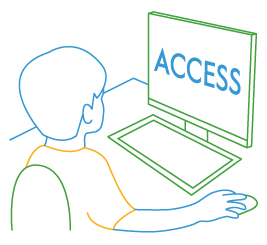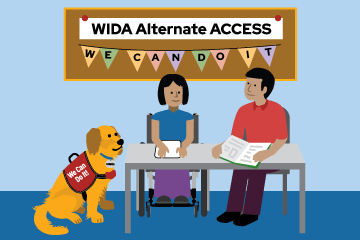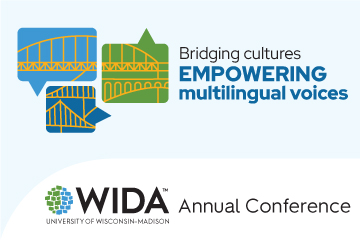ACCESS for ELLs

A suite of secure, large-scale, summative English language proficiency assessments
ACCESS for ELLs (ACCESS) is the collective name for WIDA's suite of summative English language proficiency assessments. ACCESS is taken annually by English learners in kindergarten through grade 12 in WIDA Consortium member states. WIDA provides this flexible suite of tests because we know that no single test is suitable for all students.
ACCESS for ELLs
- Is available to WIDA Consortium member states as a primary benefit of membership
- Is administered to kindergarten through grade 12 students who have been identified as English language learners (ELLs)
- Is given annually to monitor students' progress in learning academic English
- Meets U.S. federal requirements of the Every Student Succeeds Act (ESSA) for monitoring and reporting ELLs’ progress toward English language proficiency
- Is anchored in the WIDA English Language Development Standards
- Assesses the four language domains of Listening, Reading, Speaking and Writing
Features
ACCESS is available in both paper and online formats for grades 1-12. States and districts select a testing format to meet their unique needs and requirements (see your member/state page for state-specific testing requirements). Kindergarten ACCESS for ELLs and WIDA Alternate ACCESS are both paper format tests.
Each ACCESS assessment includes:
- On-demand test administrator training
- Downloadable manuals and resources
- Online material management and test coordination
- Online delivery of individual student score reports
Purpose and Use
Educators use ACCESS results, along with other WIDA resources, to make decisions about students' English academic language and to facilitate their language development.
Students' scores reflect proficiency levels ranging from Level 1 (Entering) to Level 6 (Reaching).
Test scores can be used:
- For accountability purposes
- As benchmarks against which educators can measure future performance
- As a measure to make reclassification decisions about whether a student can exit English language support services
- To support decisions about placing students into appropriate classes or groups for instruction, instructional planning
- To show the progress students have made
Scores
Each test is scored differently, depending on assessment type (paper, online, kindergarten) and domain (Listening, Reading, Speaking, Writing).
- ACCESS for ELLs Online
- The online test engine automatically scores Listening and Reading during administration.
- Our test delivery partner scores the Speaking and Writing domains in winter and spring.
- ACCESS for ELLs Paper
- States send test booklets to our test delivery partner, which scores the Listening, Reading and Writing domains.
- Test administrators score the Speaking domain in the test booklet and send to our test delivery partner, which captures the scores for reporting.
- Kindergarten ACCESS for ELLs
Test administrators score all domains in the test booklet and send them to our test delivery partner, which captures the scores for reporting.
- WIDA Alternate ACCESS
Test administrators score all domains in the test booklet and send them to our test delivery partner, which captures the scores for reporting.
States have a chance to review their data before scores are printed, allowing them to identify errors and make corrections. The test delivery partner then ships printed score reports directly to states.
Assessments in the ACCESS for ELLs Suite

ACCESS for ELLs Online
ACCESS Online is a computer-based, adaptive test that responds to student performance and may be administered in group or individual settings. This assessment is given annually to students in grades 1-12.

ACCESS for ELLs Paper
ACCESS Paper is a paper-based, semi-adaptive test that may be administered in group or individual settings. This assessment is given annually to students in grades 1-12.

Kindergarten ACCESS for ELLs
Kindergarten ACCESS is a paper-based test individually administered to kindergarten students in a game-like, interactive format. This assessment is given annually.

WIDA Alternate ACCESS
Alternate ACCESS is a large-print, paper-based test individually administered to students in grades 1-12 who are identified as English learners (ELs) with the most significant cognitive disabilities.
Related Pages

Preparing for ACCESS
An overview of what’s involved in preparing to administer ACCESS for ELLs, as well as suggestions to help you get your students ready for testing.

Accessibility and Accommodations
Guidance for supporting students with disabilities taking ACCESS for ELLs. Helpful for test administrators and IEP teams.

ACCESS Scores and Reports
An overview of how ACCESS for ELLs tests are scored and how scores can be used. Helpful for test administrators, EL educators, and school, district and state administrators.

Building a WIDA Assessment
Discover what it takes to make a high quality assessment and learn how you can get involved.




